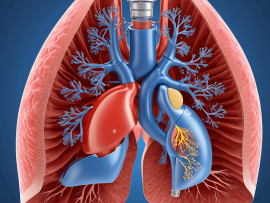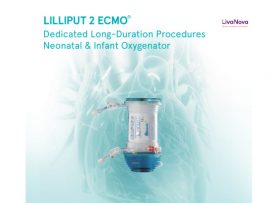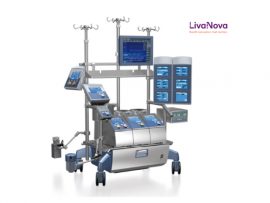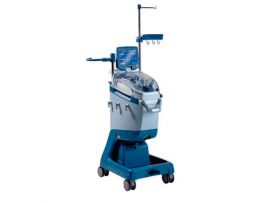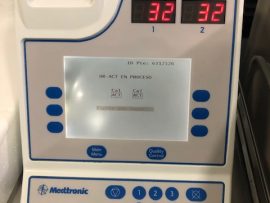Abstract Adverse events (AEs) experienced by children and adults with congenital heart disease (CHD) on ventricular assist devices (VADs) are sometimes unique to these populations. The Advanced Cardiac Therapies Improving..
Read MoreAbstract Purpose One in four deaths worldwide is due to thromboembolic disease; that is, one in four people die from blood clots first forming and then breaking off or embolizing...
Read MoreAbstract Objectives Extracorporeal cardiopulmonary resuscitation (ECPR) can save patients with refractory cardiac arrest; however, according to recent meta-analyses, only 20% of patients achieve favorable outcomes (Modified Rankin Scale 0-3). We..
Read MoreAbstract Veno-arterial extracorporeal membrane oxygenation (VA-ECMO) is used in case of potentially reversible cardiac failure and restores systemic hemodynamics. However, whether this is followed by improvement of microcirculatory perfusion is..
Read MoreAbstract Transfusion of packed red blood cell (RBCs) saves millions of lives yearly worldwide, making packed RBCs the most commonly administered drug in hospitals after vaccines. However, not all blood..
Read MoreAbstract Introduction Veno-venous extracorporeal membrane oxygenation has increasingly been utilized to support patients in respiratory failure as a bridge to recovery or lung transplantation. As patients progress from cannulation to..
Read MoreAbstract Introduction Various cannulation strategies for venoarterial extracorporeal membrane oxygenation (V-A ECMO) support are currently in use according to the clinical urgency and experience of the rescuing team. Although central..
Read MoreAbstract Background A common limitation to normothermic ex situ heart perfusion (ESHP) is functional decline. We previously designed a cardioprotective normothermic perfusion protocol, incorporating adenosine-lidocaine cardioplegia, subnormothermic reperfusion, pyruvate and..
Read MoreAbstract Introduction Spinal cord infarction (SCI) or ischemia is a rare but devastating complication of venoarterial extracorporeal membrane oxygenation (VA ECMO). The natural course and outcomes are poorly studied. Methods..
Read MoreAbstract Background While left ventricular (LV) venting reduces LV distension in cardiogenic shock patients on venoarterial extracorporeal membrane oxygenation (VA-ECMO), it may also amplify risk of acute brain injury (ABI). We..
Read MoreAbstract As mortality relating to severe acute burn injury improves, patients are surviving longer into the critical care phase, which is commonly complicated by multisystem organ failure. Extracorporeal organ support..
Read MoreAbstract Purpose Fever is frequent after extracorporeal membrane oxygenation (ECMO) decannulation. We aimed to evaluate the incidence of post-decannulation fever and describe its causes. Methods Adult ECMO patients who were..
Read MoreAbstract Cardiogenic shock (CS) is a highly complex clinical condition that requires a management strategy focused on early resolution of the underlying cause and the provision of circulatory support. In..
Read MoreAbstract Objective: Massive pulmonary embolism (PE) remains a life-threatening condition, often leading to acute respiratory and cardiac failure. This study evaluates the role of extracorporeal membrane oxygenation (ECMO) as a..
Read MoreAbstract Aim of the study Predictive factors for poor outcomes in hypothermic cardiac arrest (HCA) differ from those in normothermic out-of-hospital cardiac arrest (OHCA). This study aimed to evaluate the..
Read MoreAbstract Pediatric extracorporeal membrane oxygenation (ECMO) provides lifesaving cardiopulmonary support for patients with a multitude of clinical diagnoses, resulting from cardiac and/or respiratory failure refractory to conventional supports (). The..
Read MoreAbstract This review discusses the pivotal role of microcirculation in maintaining tissue oxygenation and waste removal and highlights its significance in various pathological conditions. It delves into the cellular mechanisms..
Read MoreAbstract Extracorporeal membrane oxygenation (ECMO) is a life-saving intervention for patients with circulatory and/or pulmonary failure; however, the rate of complications remains high. ECMO induces systemic inflammation, which may activate..
Read MoreAbstract BACKGROUND Patients with severe traumatic brain injury (TBI) are at an increased risk of respiratory failure refractory to traditional therapies. The safety of extracorporeal membrane oxygenation (ECMO) in this..
Read MoreAbstract Background Veno-venous extracorporeal membrane oxygenation (VV-ECMO) is a supportive therapy for acute respiratory failure with increased risk of packed red blood cells (PRBC) transfusion. Blood cell salvage (BCS) aims..
Read MoreAbstract Introduction: Pediatric extracorporeal membrane oxygenation (ECMO) management presents unique challenges in acute care settings, requiring specialized expertise to manage critically ill children. Medical and surgical fellows often manage these patients,..
Read MoreAbstract Background The pathology of primary hemostasis is a common complication of extracorporeal membrane oxygenation (ECMO) support. Scientific data describing its changes in patients on short-term ECMO support and the..
Read MoreAbstract Background Clinical blood resources are scarce and autologous blood transfusion for extracorporeal membrane oxygenation (ECMO) withdrawal is less studied. Objectives To assess the use of staged autotransfusion during ECMO..
Read MoreAbstract The use of extracorporeal life support (ECLS) throughout the perioperative phase of lung transplantation requires nuanced planning and execution by an integrated team of multidisciplinary experts. To date, no..
Read MoreAbstract Purpose A human cadaveric model combining standard lung protective mechanical ventilation and modified cardiac bypass techniques was developed to allow investigation into automated modes of detection of venous air..
Read MoreAbstract Extracorporeal membrane oxygenation is increasingly being used to support patients with hypoxemic respiratory failure and cardiogenic shock. During the COVID-19 pandemic, consensus guidance recommended extracorporeal life support for patients..
Read MoreAbstract Objective: To assess the impact of post-protamine neutralisation activated clotting time (ACT) values on postoperative outcomes including chest drain output, transfusion requirements, and CICU stay, in patients undergoing cardiac surgery...
Read MoreAbstract Introduction This study aimed to identify characteristics associated with survival during and post Extra Corporeal Membrane Oxygenation (ECMO) therapy, in patients with acute respiratory distress syndrome (ARDS) during the..
Read MoreAbstract Background: Delayed extubation with mechanical ventilation after cardiac valve surgery is an important clinical challenge. Early extubation can improve the survival rate and prognosis of patients. The study aims..
Read MoreAbstract Background: This study examines the results of autopsy examinations specifically aimed at documenting complications arising from the implantation phase and treatment with veno–arterial extracorporeal membrane oxygenation (VA-ECMO) in patients with..
Read More










